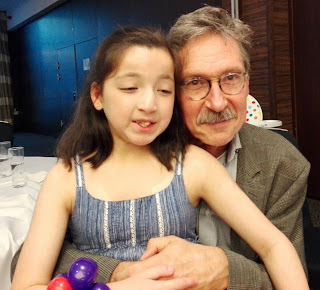 |
| Maria and Raoul Hennekam in June 2018 |
The CREB protein is used to help gene transcription and expression in the human body. RTS people have a genetic defect that prevents the CREB protein from being manufactured is sufficient quantities. You probably know that already.
So, in short, we have a way to compensate for the lack of CREB protein produced and if the trial for FXS is successful then it might be used to help people with RTS.
Raoul was excited by this new development, which could help RTS patients in several areas of mental processing and behaviour. However, he warned that those parts of the brain that are physically underdeveloped may not benefit from such treatment. We wait with bated breath!
Other speakers included Gavin Pride-Williams on wills, trusts, probate and tax planning. Laxmi Patel spoke about Education, Health and Care (EHC) Plans, which, unfortunately, didn't apply to families like us living in Wales. Wales still uses the old SEN Statement. But after hearing what Laxmi said about EHC Plans, there didn't seem to be much difference between these and the old SEN Statements.
Elizabeth Perry gave an thought-provoking presentation on the legal aspects of caring for an RTS person. This included a look at community care law and mental capacity, which related to my concerns about what happens if Maria wants further education or to get married.
In the evening we had dinner. Following desert, Jane Waite and Hayley Crawford showed us a new RTS video they had just launched on the FIND website. The evening ended with a disco, games and other activities. In short, we had a great time and I met many new RTS families.
If only every country could have this kind of wonderful RTS support. My hope is that those visitors from other countries who attend our events are inspired to form their own RTS support groups.
POSTSCRIPT AND WARNING: please note that rolipram is poisonous to humans.